In the ceaseless search for cooperative games with a compelling theme, Arkham Horror: The Card Game was sure to come up eventually, and we are both glad to have played it. One point we can definitely agree on is that it is a compelling experience that generates strong emotions. Lovecraftian lore isn't a longitudinal interest for us, but we can also agree that in this context, we both like it. The art is fantastic and fits the tenor of the story perfectly.
You play as investigators looking into mysterious goings-on around Arkham, and while you’re dropped immediately into some actions, your characters aren’t going in unprepared. Each player has a deck of weapons, abilities, and special items that can assist them in investigating what’s happening, or fighting the unspeakable horrors that are trying to stop you.
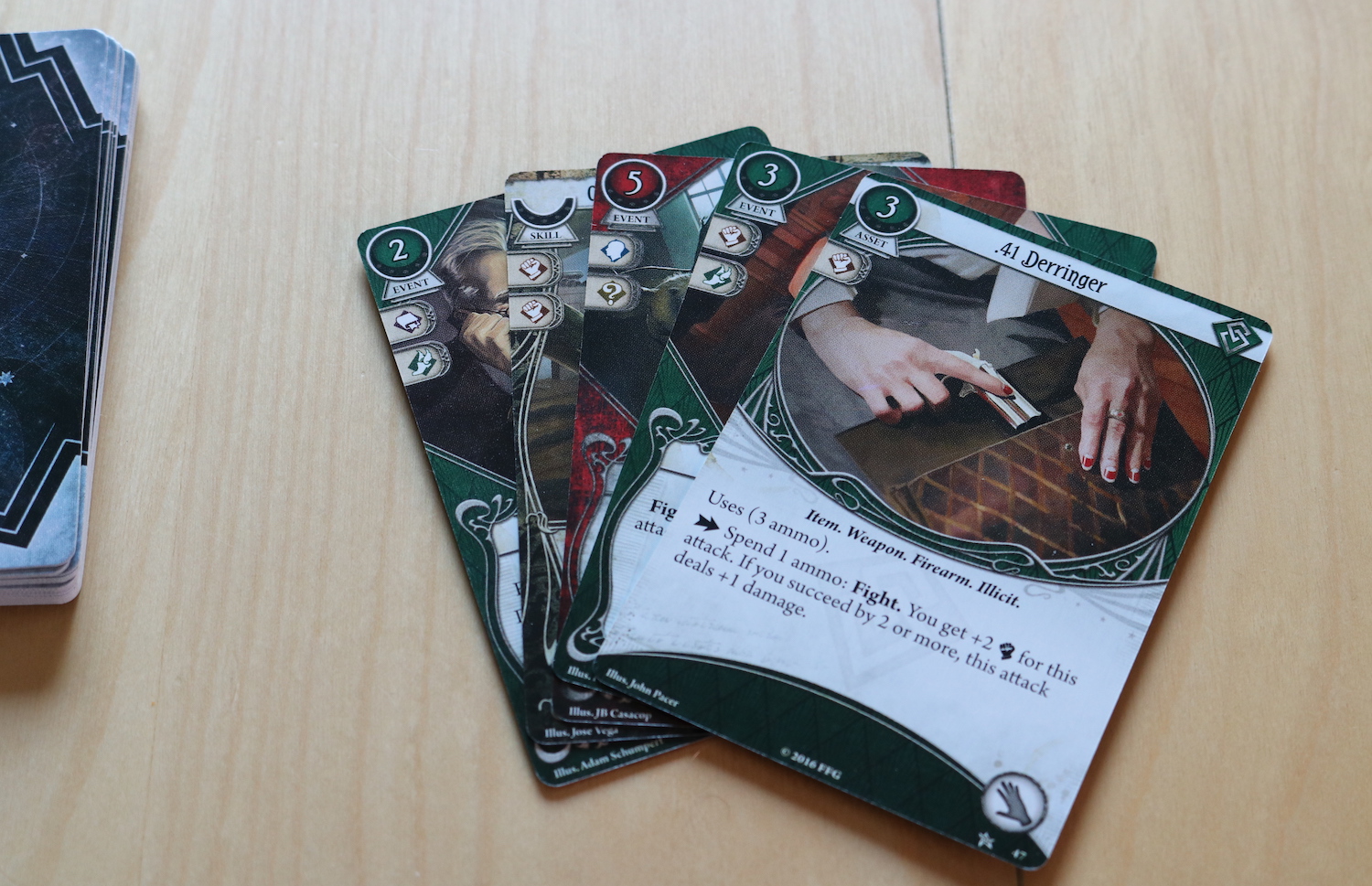
The Core Set comes with a 3 act introductory campaign (Night of the Zealot) that will get you started, and enough cards to play 2 of 4 starting characters. Adding a second core set will let you play with 4 players.
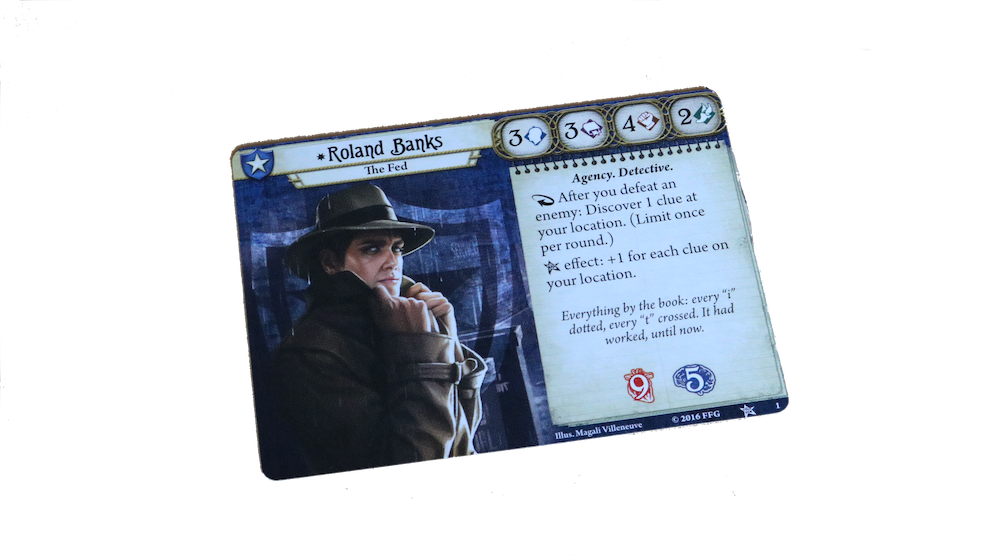
Each turn investigators can perform up to 3 actions while moving around various locations in the scenario. Investigators can discover clues that will advance their act deck and they can discover more about what is happening. At the end of the turn, the ‘Mythos’ exerts its will upon the world, where enemies attack, new enemies are spawned, or the ‘agenda’ can advance, pushing the world closer to chaos.
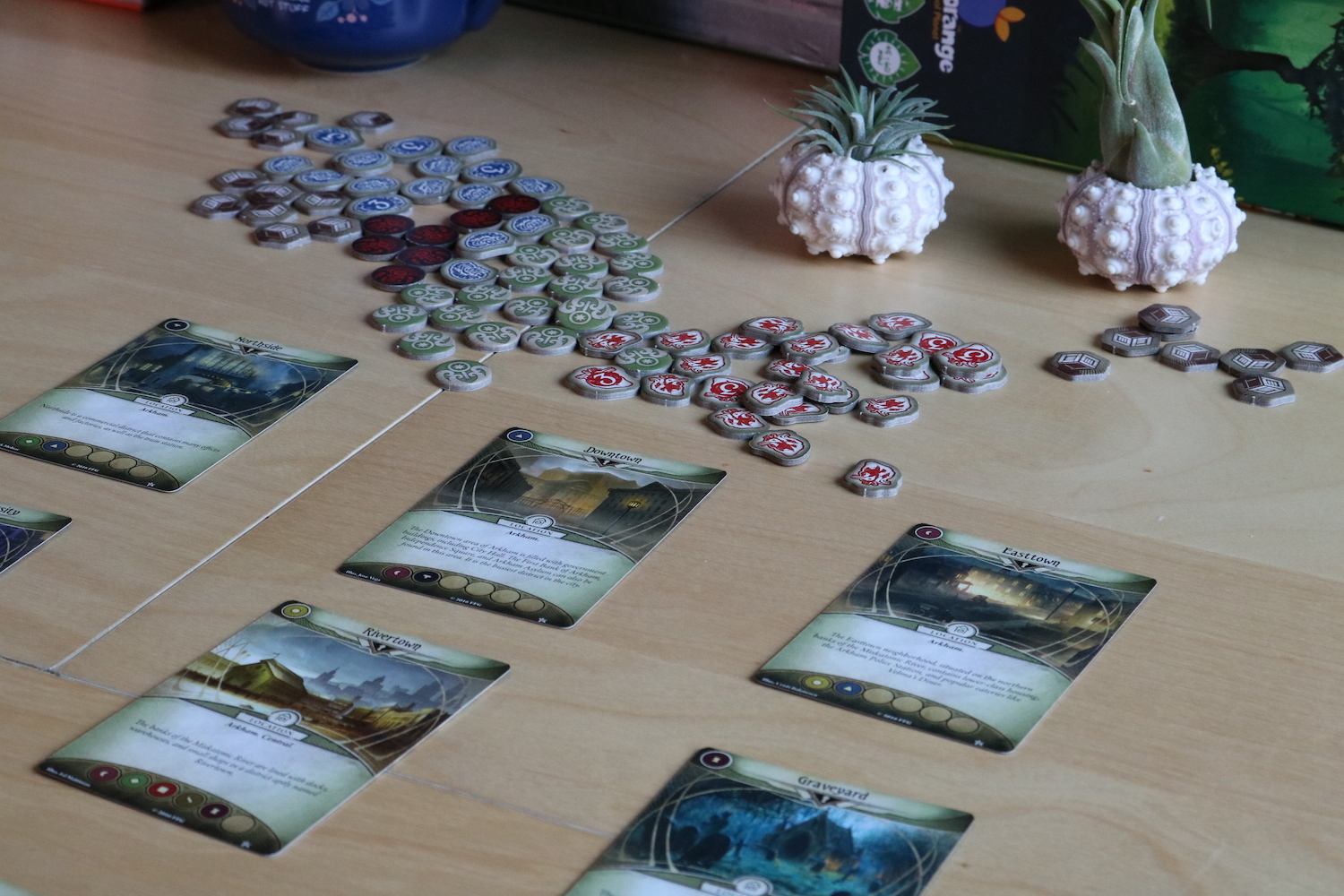
Replayability
The first playthrough will always feel the most exciting because every action is fraught with anxiety about what new horrible thing is going to happen next. However, due to the difficulty in successfully unlocking the entire narrative, there will still be new elements to uncover on subsequent playthroughs. Success isn't guaranteed, but the game accounts for varying degrees of success, so failure doesn't mean players can't advance to the next stage of the game. This element of having to live with failure is something we as videogamers struggled with on our first playthrough - where is the quick load option?? Can't we try this fight again? But no - we had to accept defeat and move on, and it makes Arkham Horror: The Card Game a better experience. The difficulty can be decreased and also increased per the rulebook (primarily by stacking the chaos bag with varying degrees of unfavorable tokens), although it's hard to imagine a more difficult scenario being survivable? Unfortunately, the first campaign struggles a bit with snowballing failures. If you aren't very successful in the first act of the campaign, it increases the difficulty of the second. Doing poorly in the second act makes the third even harder. If the first act doesn't go well, it's honestly not the worst idea to just start over from scratch, at least until you get a feel for it.
Although the plot beats will remain the same, it is also satisfying to play the same campaign over using different characters who have different decks. Players who inherently enjoy deckbuilding will find this aspect of the game the most satisfying. All the characters have different proficiencies in the 4 skills (roughly: willpower, intelligence, physical attack, dexterity) and different classes of cards that they can pull from. We can say we had a pretty different experience playing through as Roland (a cop) and Wendy (an orphan) compared to Skids (an ex-con) and Daisy (a librarian).
Cost
The main way you will continue playing this game is by purchasing expansions. Arkham Horror is a 'living' card game, so it is constantly evolving with these new expansions, and you can freely use cards from any expansion when constructing a deck for any of the campaigns.
These expansions come in two flavors: "Deluxe" expansions, which contain new investigators, new player cards, and usually 2 scenarios, or "Mythos" packs, which contain the rest of the scenarios for a particular campaign. (There are also Mythos packs with short stand-alone missions available as well). The second campaign after the core set is called "Dunwich Legacy". MSRP for deluxe expansions is $30, and $15 for Mythos packs. So, full price will be $120+tax/shipping for the 8 act campaign, a steep price in addition to the $40 original pack. Even with the cheapest prices we could find online it'll run you at least $90 + shipping. There are also some fan-created campaigns, some of which we've tested and will cover in a separate review.
We did end up buying the first expansion before finishing this review. It did give us a lot more deckbuilding options over just a core set, and we found more sales on the deluxe expansions (presumptively to get players hooked into then buying all the mythos packs for a campaign).
It's hard to fully ignore the price aspect of this. It's not quite as expensive as buying into something like Magic: The Gathering, but it's not an insignificant investment. For less than the price of the core set and first expansion campaign (2 campaigns, 11 acts) you could buy Gloomhaven!
Setup
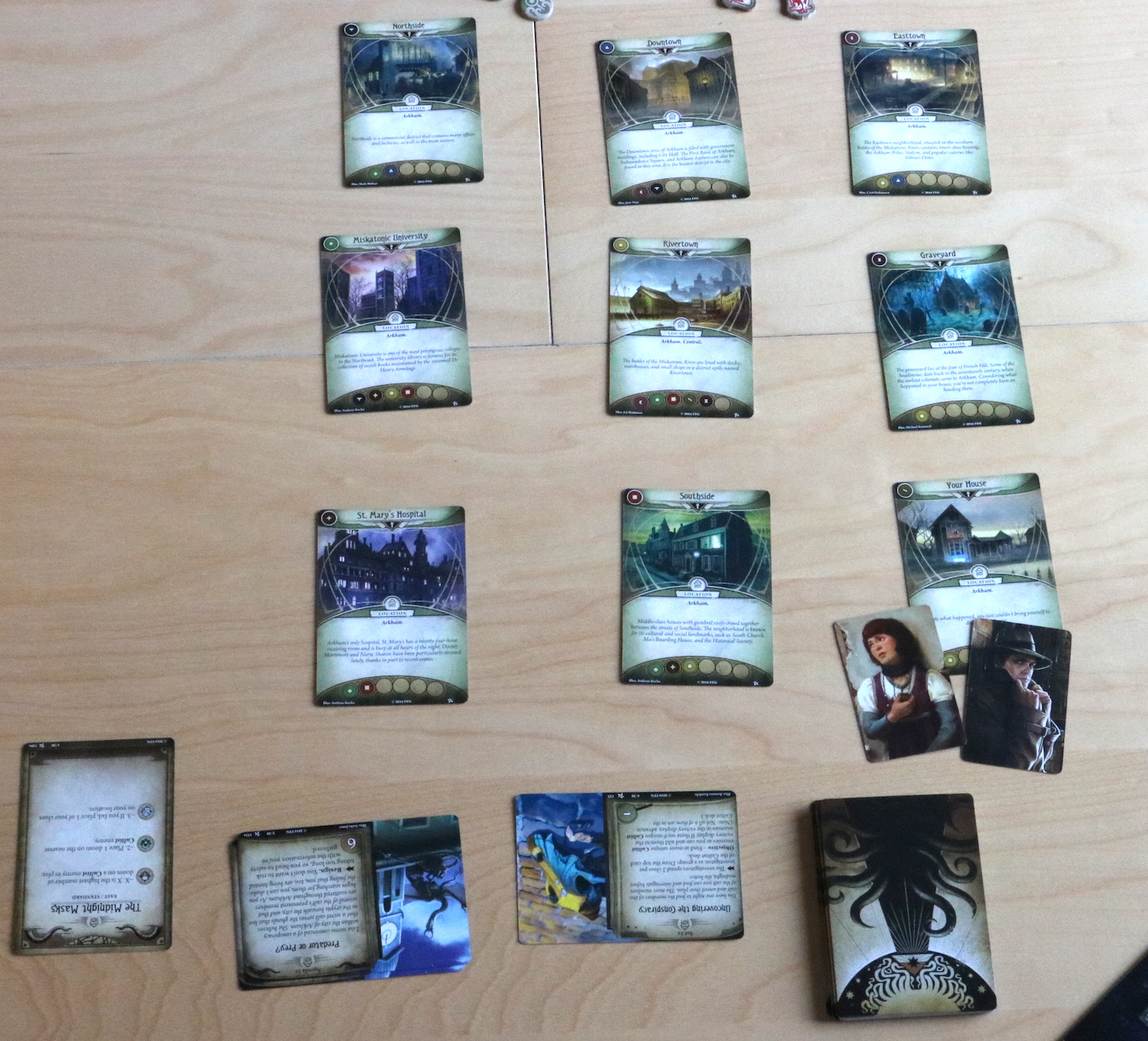
Setup time is important to us due to the limited amount of time we have for gaming. Set up is cumbersome, and there is a significant time investment in learning what cards are in the deck, what they do, how to spend upgrade points... nevertheless, it’s worth it if you enjoy playing this game. There are some tools out there to help with deck management, which can be helpful for players who have different campaigns going with different groups, players who are experimenting with different characters, or players who like to obsess over digital lists. Some of these also provide some analytics on the deck. Alex has experimented with a couple of these and would recommend ArkhamDB.com. He also tried the “Arkham Decks” app on the iPhone, but wouldn't recommend it as highly due to its lack of integration with web services and no campaign support. The “Arkham Cards” app on iPhone does sync with ArkhamDB and also adds campaign support!
Solo Play
Arkham Horror: LCG does fit quite well as a solo game! It’s playable with just one investigator, or controlling multiple at once. You lose some of the fun aspects of communicating and planning your moves with someone else, but can enjoy the story at your own pace. Playing with multiple investigators once you have a feel for the game can be quite enjoyable as you have full information and can plan your moves like a chess match. Thematically it can be a bit more grim, as there’s no other person to crack a lighthearted joke about how you just wandered into the woods, then your character suddenly got amnesia and forgot how you were chasing the ultimate evil. Arkham Horror comes highly recommended as a solo game and doesn’t disappoint.
Lovecraft
Arkham Horror: LCG is very true to its Lovecraftian roots in its gameplay. This is not a fair game. Your characters are imperfect heroes–no, not heroes, just people who are in way over their heads. As the player, it can feel this way a bit as well. Nothing is on your side, and things can go very wrong, very fast.
The issue can be when you feel like you’ve lost agency in your failure. While that fits incredibly well with supernatural gods from other dimensions coming to mess with you, as a game it can fall down a bit. You will fail often, but more often it’s not anything you did, but rather luck.
Randomness has its place in all board games, it provides a new experience different times you play it, it can be a balancing mechanic, it can make you rely on probability. The best kind of random though is the kind that allows you to react to it. An example is any sort of draw mechanism. Between two actions: draw a random card, or draw 3 and pick one, I believe the latter is superior. Both options are luck driven, but one gives the player a lot more agency, and ability to react and pick the best of various options. The issue with Arkham is that some of the mechanisms give the player no agency; drawing an auto-fail token, for example, or being forced to discard your entire hand twice in 3 turns (if you have no cards left in your hand, how can you make the most of your options?). It’s still a good game, and many unfavorable draws can be mitigated with additional cards, but it can be brutal.
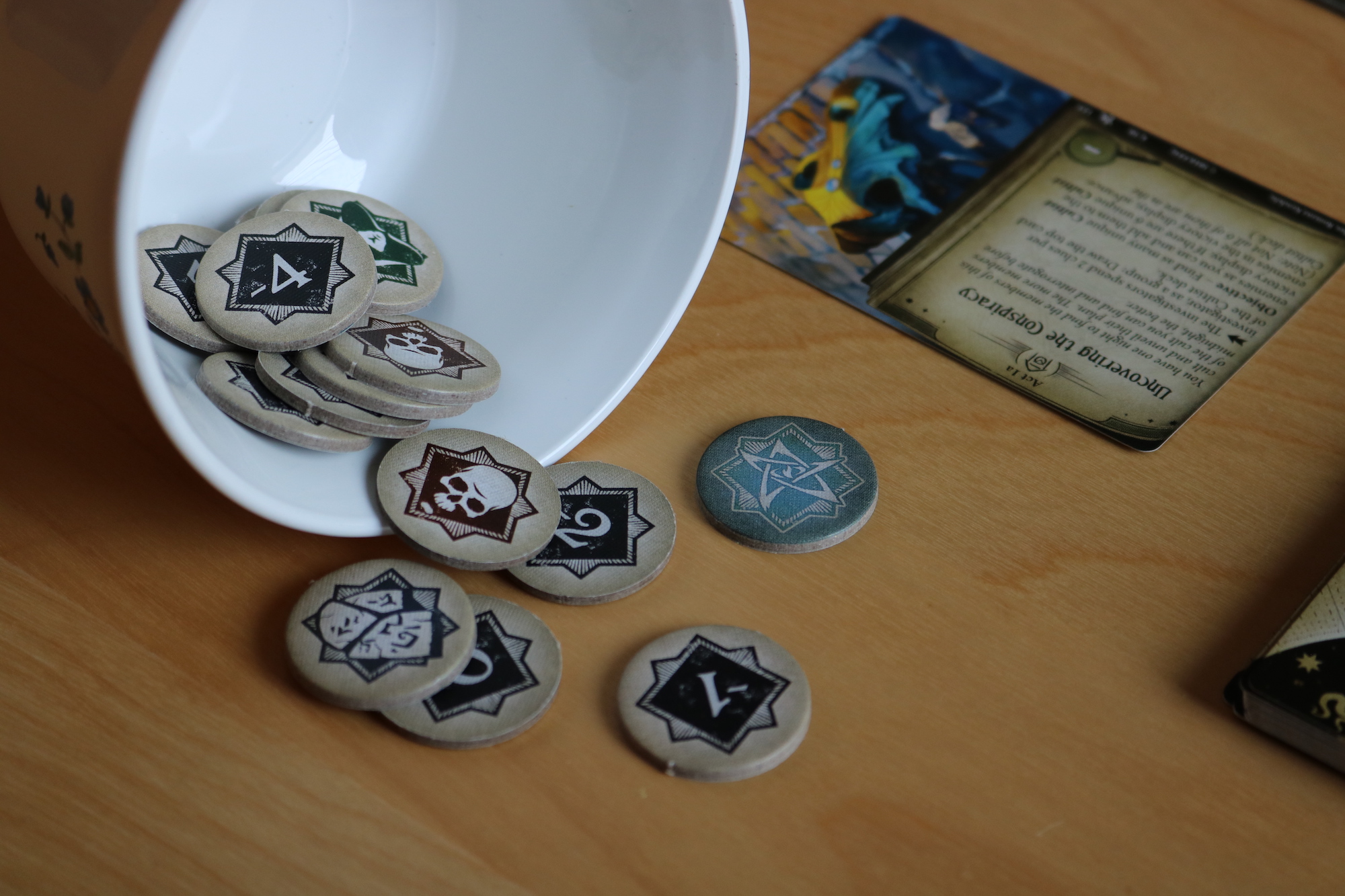
As new players to this game, we had some terrible random chance (we had to leave the second mission in 4 turns due to a combination of doom tokens and drawn enemies on our first play-through) which has colored our opinion a bit. We’d like to think about what we could do differently the next play-through and the answer was: play it again and draw different cards. With limited gaming time, spending 40 minutes on playing a game, only to have it all fall to pieces despite a promising setup, was disappointing. For a summary of our second act of the Night of the Zealot campaign (with spoilers), see the bottom of this review.
The End Result
So perhaps if you're a bit of masochist, and definitely if you enjoy the sensation that success is impossible and your doom is inevitable and all your luck comes from a bag that's weighted against you, you might enjoy this game! The story is compelling and the visual experience is both unique and satisfying. If you don't quite fit into that category of special people, you may still get many hours of entertainment out of this game if your group is willing to bend the rules just a bit and face the indignity of playing the "easy" version. Just be willing to repeat acts due to failure if needed and laugh along with the failures (maybe a few beverages would help).
TC recommends this as a panini game with these caveats. If you are new to these sorts of games like us, consider the 'easy' set of chaos tokens. It makes it so you don't feel like a complete failure all the time, just some of the time. It mitigates some of the effects of randomness that can harm a first time playthrough, and bounce you off this otherwise excellent game. Others have also posted suggestions for house rules to make the game play a little bit more easygoing; making these alterations would be another way to make the game less stressful. If you've played other games in this vein like the Lord of the Rings version: I don't know why you're reading our review, you've probably already beat this game. If you're drawn in by the deckbuilding: a reminder that you’ll really need a second core set or the Dunwich Legacy expansion.
Spoiler
For those wondering just how bad our luck was during our first playthrough of Act 2, here are the details:
We started with an Acolyte (1 Doom) in Southside (2 spots away from our house). We aren't too worried so spend some time getting ready (a mistake). With a mysterious chanting, another acolyte (4 doom on the board, plus turn one Mythos doom, 5 doom), the next mythos phase (beginning of turn three) reveals the hunter. We have to deal with the hunter and the acolyte that has 3 doom on it. We are terrified of the next agenda as this hunter just popped up. We end up killing off the acolyte and dealing some (but not all) of the damage to the hunter, and we pull the ghoul priest. By the time we kill the hunter the ghoul priest is on us. With Roland's only weapon being a knife that I used to damage the hunter, a miss and an attack from the priest leads to Roland being one turn away from death. We don't see an out and end up resigning having defeated one named cultist (the hunter), gaining no clues, revealing no other named cultists.
Looking back at it now the first turn encounters combo'd with the ghoul priest spawning on the 4th encounter draw was about as bad as it gets. It's disappointing as our first experience, the most exciting and nerve-wracking one, ended within 15 minutes.
